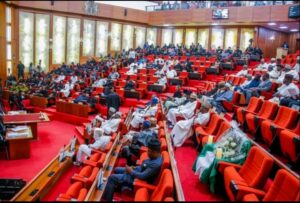Bill to Regulate Informal Work, License Job Agencies Passes Second Reading at Senate

The Senate has taken a major step toward protecting informal sector workers by advancing a bill that seeks to regulate private employment agencies and formalize labour conditions for domestic staff, apprentices, and other informal workers.
The Informal Sector Private Employment Agencies (Regulation) Bill 2025, sponsored by Senator Mohammed Sani Musa (APC, Niger East), passed second reading during plenary on Tuesday.
If enacted, the bill will empower the National Directorate of Employment (NDE) to license and oversee private job agencies across the country.
The legislation aims to ensure standardized employment practices, fair recruitment, and adequate worker protection, particularly for millions of Nigerians working outside the formal labor system.
“The informal sector is a significant contributor to our economy, but it remains one of the most vulnerable. This bill will provide a legal framework to protect domestic workers, apprentices, and interns, and align our labor practices with international standards,” Senator Musa said.
Under the proposed framework, job agencies will be required to maintain a centralized database of informal workers and adhere to transparent recruitment procedures.
The bill also mandates compliance with labor rights as set out by the International Labour Organization (ILO).
While the Senate largely supported the bill, concerns were raised about potential abuse.
Senator Adams Oshiomhole (APC, Edo South) warned against the exploitation of workers by third-party recruiters, citing examples of cleaners and aides in federal institutions who are paid far less than their government-employed peers.
“We must ensure this does not become a tool for legalized exploitation. Workers should not be paid peanuts while agencies reap the profits,” Oshiomhole cautioned.
The bill has been referred to the Senate Committee on Labour and Employment for further scrutiny, with a report expected in six weeks. If passed into law, it could mark a significant shift in Nigeria’s approach to labor rights and social protection for informal workers.
Analysts say the legislation could also bring much-needed order to the rapidly growing private employment agency sector, many of which operate with little oversight.







